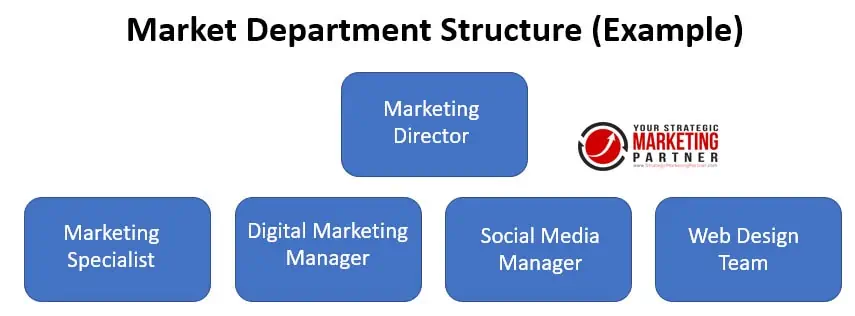What is Operational Excellence and Why is it Important?
If you read our tutorial on choosing your customer value proposition, you already know the three fundamental business models are: […]
Read More »Become a successful marketing consultant: Learn more

Regardless of the industry that your business competes in, marketing plays a crucial role in attracting and retaining customers.
In this brief tutorial we are going to teach you how to structure your marketing department.
To structure your marketing department, start with the customer. Define your customer demographics, psychographics and how to communicate with them. Then build your team beginning with team members who can help you attract new customers and retain customers.
Unfortunately, most business owners, including both small and established businesses, don’t know how to structure their marketing departments. This guide outlines some of the best practices to observe when structuring your marketing department.

Structuring your marketing department is a challenging task. As mentioned, marketing is a dynamic industry. With these imminent changes, marketing team structures and individual job descriptions also change. Therefore, to adapt, companies should build a marketing team that adapts to changing times.
Below are some tips for building a future-proof marketing department.
Before looking at the various approaches of building a marketing team, remember that no one-size-fits-all. Generally, marketing can be categorized into two groups; distributed and centralized. You can use either approach to build your marketing team. As the name suggests, a distributed marketing approach involves dividing your marketing department into different teams, each defined by marketing roles, location, and product lines. Each team should work on identified goals independently from other teams.
On the other hand, a centralized marketing approach involves using a single team to coordinate every marketing element. While the centralized approach has a lot of coordination, it has limited flexibility. Both centralized and distributed marketing approaches have pros and cons. Therefore, begin by identifying what suits your organization.
If you are just getting started and need to hire your first marketing team member, many companies focus on hiring a Marketing Manager with a wide skillset who can manage a lot of projects simultaneously, including: handling the marketing budget, the marketing calendar, overseeing the web team (probably outsourced), email promotional campaigns, PPC, SEO and content, social media, print ad campaigns, direct mail letters, postcards and more.
At a certain point this person will need some help because they will quickly get overwhelmed and production quality will decline. This additional person in the marketing department may be a Marketing Specialist and can help take the load off the Marketing Manager.
When building your marketing department, you might be tempted to assign all functions, ranging from search engine marketing, social media marketing, email marketing, web design, and more, to your small team. Doing this will stretch your small teams excessively. Therefore, the best place to begin is researching your target audience and identifying what they respond to.
For instance, if most of your customers prefer Facebook to Instagram or prefer reading emails than using social media, use these findings to curate a marketing strategy that gets to them. The best way to build your marketing team is to keep everything as lean as possible. Through this, you can focus on maximizing quality over quantity. You also get to focus on channels and use specific tactics that give results.
Another crucial aspect of creating a future-proof marketing team is hiring a team with diverse backgrounds and skill sets. Rolling out an effective marketing strategy requires a lot of flexibility and versatility. Therefore, hiring a team with varying perspectives can help create marketing messages that connect with a broad audience.
Hiring people with diverse skill sets is also beneficial as it ensures that your team can handle various tasks. It will also cut on labor costs, as you won’t have to hire specialists for different tasks.
Having identified your preferred marketing strategy and hired a marketing team, you should focus on setting goals. You should set clear goals for your marketing teams and your business at large. The head of marketing departments should design and communicate the specific strategies for meeting these goals to their teams.
Below are important positions and skills set that make up a marketing team;
Marketing managers are responsible for the development and implementation of your marketing strategy. They also oversee the performance of other marketing departments. Roles within marketing management include;
As the name suggests, social media teams are tasked with creating and executing social media marketing efforts. As such, this team should have content creation skills, social media management skills, graphic design skills, and basic SEO knowledge.
The team should create engaging content, drive brand awareness, connect with the audience, and generate leads. They should also know how to measure the performance of social media content. Roles within the social media team include;
Search engine optimization is an important part of modern marketing. As such, your SEO team should focus on driving traffic to your website through content optimization. Your SEO team should have excellent technical, writing, and programming skills to achieve these goals.
They should also be ready to edit and proofread content to suit your target audience. They should find and implement keywords to improve your Google rankings and develop link-building strategies. Roles in this team include;
In the current age of digitalization, your business should have a functional website. Your website should also be maintained regularly. Roles within your web design team include;
Even though your marketing teams should be customer-centered, your customer acquisition team primarily focuses on guiding customers throughout the buyer journey. This team is the point of contact with your target customers as they introduce your brand to customers. They should communicate to customers as your brand’s representative, thus need excellent interpersonal skills.
This team should also understand your company in-depth and pay great attention to detail. They should capitalize on every moment and convey how your products are beneficial to the target customers.
Your digital marketing team focuses on creating and overseeing the performance of paid promotions. They include;
Unfortunately, there is no perfect answer on how big your marketing department should be. This is because large and established businesses have different marketing needs than startups. However, regardless of your business size, the optimal size of your marketing team highly depends on the following;
Regardless of the size of your marketing department, remember that managing a smaller team is easier. Small teams have better agility, speed and react better. However, members will have to take on a lot of tasks. On the other hand, while tasks are spread out in large teams, managing such teams is challenging. Bureaucracy also develops with large teams, and communication is muddled.
A marketing team consists of professionals with diverse roles, all with the main goal of attracting customers and increasing brand awareness. As marketing departments continue evolving, new roles that require additional teams get introduced. Therefore, your marketing team and structure may keep ballooning from time to time. As you structure your marketing department, ensure that you hire the best talent that can adapt to change.